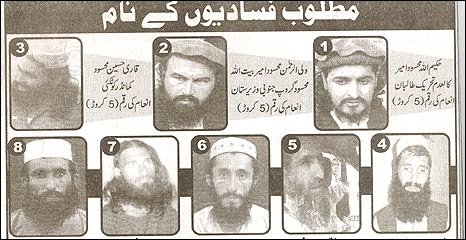|
|
|
Eight South Waziristan Taliban commanders, pictured in a ‘wanted’ poster: 1. Hakeemullah Mehsud, 2. Waliur Rehman Mehsud, 3. Qari Hussain Mehsud, 4. Azam Tariq, 5. Maulvi Azmatullah, 6. Mufti Noor Wali, 7. Asmatullah Shaheen Bhittani, 8. Mohammad Anwar Gandapur. |
The Movement of the Taliban in Pakistan has appointed Asmatullah Shaheen Bhittani to serve as the group’s interim leader after Hakeemullah Mehsud was killed by the US in a drone strike just two days ago. Asmatullah has previously vowed to wage jihad against US forces in Afghanistan and has led military and suicide operations in Pakistan.
“Asmatullah Shaheen Bhittani, the head of the supreme shura, has has been appointed as temporary head of the TTP [Movement of the Taliban in Pakistan],” Shahidullah Shahid, a top spokesman for the Pakistani Taliban told AFP.
The naming of Asmatullah as interim leader took place just one day after reports from Pakistan indicated that Khan Said, the group’s deputy emir who is also known as Sajna Mehsud, was appointed to lead the Movement of the Taliban in Pakistan. The Pakistani Taliban did not officially confirm the report.
Sajna is said to have been approved by a majority of the Pakistani Taliban leaders who attended a shura, or council, to replace Hakeemullah. But it was rumored that commanders in the remote areas of Pakistan had not weighed in on Hakeemullah’s replacement.
Other leaders thought to be in the running to replace Hakeemullah are Mohmand chief Omar Khalid al Khorasani, Swat commander Mullah Fazlullah, and Ghalib Mehsud. Sajna is thought to be the favorite to replace Hakeemullah.
Asmatullah is a dangerous Taliban commander
Asmatullah currently serves as the leader of the Movement of the Taliban in Pakistan’s “supreme shura,” or executive council. He has served as a senior commander in the tribal areas for nearly a decade. He is among the 20 most-wanted Taliban commanders operating in South Waziristan, Tank, and Dera Ismail Khan. In 2009, the Pakistani government placed a $120,000 bounty on his head.
He served as a military commander in the towns of Jandola and Tank in the district of Tank and reported directly to Hakeemullah. In late 2009, many Taliban commanders fled the Mehsud tribal areas of South Waziristan to avoid the Pakistani Army offensive that was launched in October of that year. Seeking to escape the military dragnet, the Taliban commanders fled to North Waziristan, Arakzai, Kurram, Khyber, and to areas in South Waziristan that are under the control of the Mullah Nazir Group.
In 2009, Asmatullah and some of his fighters relocated to the southern port city of Karachi, where he continued attacks. On Dec. 30, 2009, Asmatullah claimed that one of his fighters carried out the Dec. 28 suicide attack against a Shia religious procession in Karachi that killed 43 people and wounded more than 100.
By 2011, Asmatullah was back in the tribal areas conducting military operations. In December 2011, his forces overran a Frontier Corps fort in the settled district of Tank. Fifteen Frontier Corps troops were captured and one was killed during the raid.
After the assault on the Frontier Corps outpost in Tank, Asmatullah claimed credit for the attack and said it was carried out to avenge the death of Taj Gul Mehsud, who was killed along with 12 other fighters in a US airstrike on Oct. 26, 2011. Taj Gul Mehsud was a senior deputy to Hakeemullah.
Asmatullah has also waged jihad against US and Coalition forces in Afghanistan. In 2006, he openly recruited fighters to battle in Afghanistan and called for the imposition of sharia, or Islamic law, in Pakistan.
“We are leaving for Afghanistan tomorrow, those who want to participate in Jihad can join us,” Asmatullah told a group of Pakistanis in the town of Jandola in the district of Tank.








